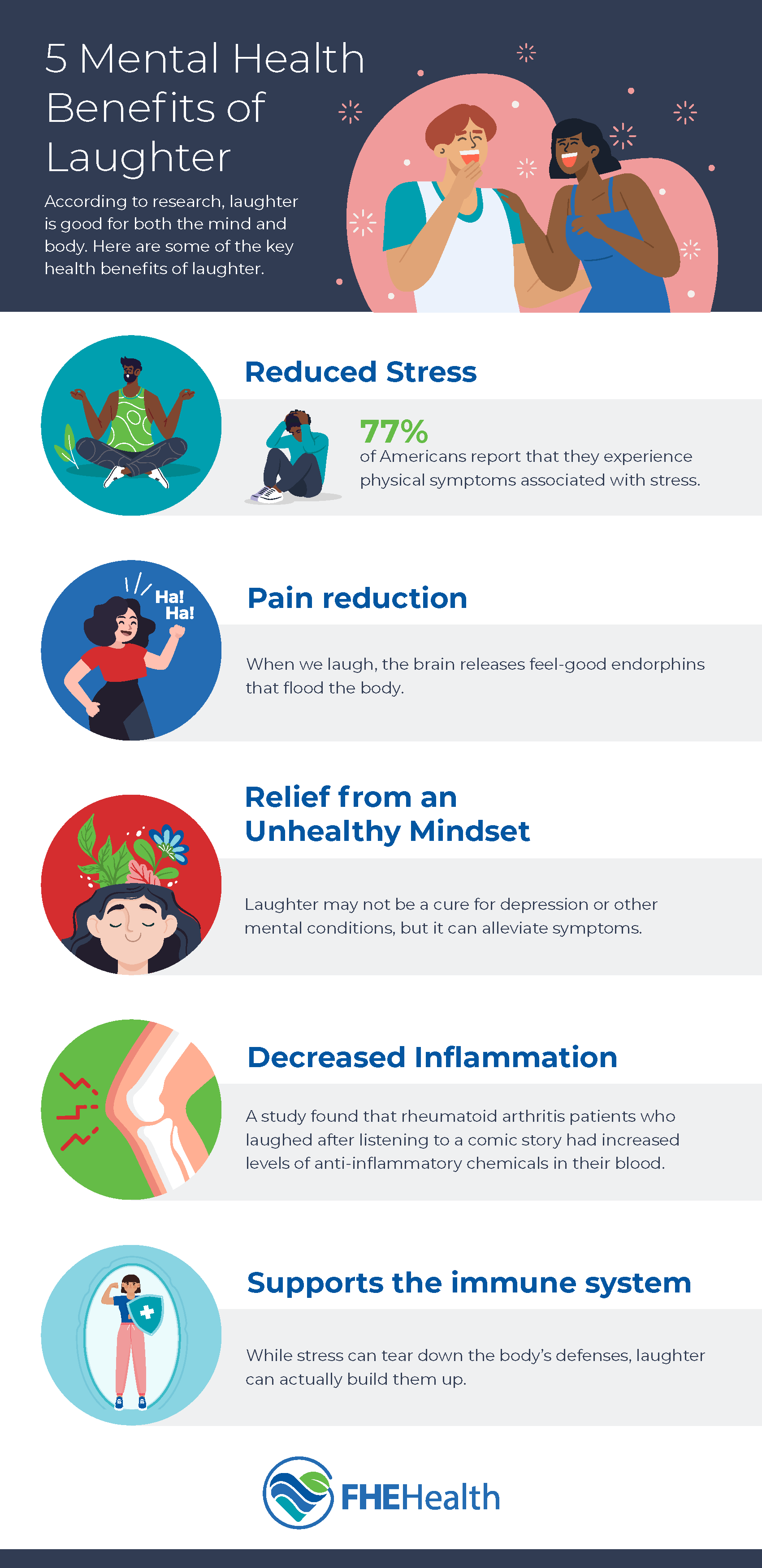
Laughter is good for you–and that’s no joke! Most of us have heard the saying that “laughter is the best medicine,” but not everyone is aware that scientific evidence supports that theory. According to research, laughter is good for both the mind and body. If you’ve ever experienced a long, deep belly laugh, you likely experienced some feel-good sensations. There are various reasons for why we feel good after laughing. Here, we’ll explore some of the key health benefits of laughter.
5 Benefits of Humor
Life inevitably has its twists and turns, but the more you can smile and laugh, the better you may feel. While laughter often happens spontaneously, (and in this sense is hard to plan), it is possible to seek out situations and relationships that lend themselves to laughter. Here are some of the benefits of doing so….
Reduced Stress
Roughly 77 percent of Americans report that they experience physical symptoms associated with stress. These symptoms often include headache, nausea, fatigue, changes in appetite, and muscle tension. Unchecked chronic stress, however, can lead to other health problems such as increased blood pressure, which can help pave the way to heart disease. Many individuals living with chronic stress cite money matters and work as leading causes of their stress. They also report that their stress has a negative impact on both their personal and professional life.
Laughter is a remarkable form of stress relief. The act of laughing interrupts your stress response, helping to reset it and provide you with feelings of relaxation. The relief may be temporary; however, with some relaxation and stress management techniques, you may be able to capitalize on the laughter that set your relief in motion.
Pain Reduction
Physical pain can take a toll on an individual’s quality of life. People might experience pain as a result of an injury, a surgery, or a temporary or chronic health condition. Medical research suggests that laughing can ease pain symptoms, but how? Does humor cause us to forget the pain we’re experiencing?
Scientists believe that the mechanism that allows laughter to seemingly soothe pain is a chemical one. When we laugh, the brain releases feel-good endorphins that flood the body. You’ve probably experienced this flood of endorphins when you’ve exercised–swam for a distance or gone for a run. Even though you may experience sore muscles from your exertion, you find that you feel good. That’s the endorphins going to work, easing the aches and triggering the body’s natural healing processes.
Apparently, laughter also causes the release of these feel-good endorphins, too. Watching a comedy, laughing with a friend, or reading a funny book may help provide some pain relief.
Relief from an Unhealthy Mindset
It’s not uncommon for people to find themselves in a mental rut from time to time. Feeling depressed or anxious, however, is painful and can detract from our day-to-day quality of life. If these feelings linger, they may indicate that a mental or mood disorder has developed. Laughter may not be a cure for depression or other mental conditions, but it can alleviate symptoms.
Just as released endorphins triggered by laughter can reduce physical pain, they can also alleviate mental pain. These feel-good endorphins flood the brain, leading to feelings of relief. For people battling sadness, grief, or loneliness, that relief is a place to build on, where one can focus on healing.
Laughing routinely can help people protect their mindset. A person who is prone to feeling negative emotions might find it difficult to laugh. In these cases, it’s helpful to seek out people, films, or books that can help you see the more comedic side of life.
Decreased Inflammation
Inflammation is often the harbinger of disease. Medical researchers have long understood the connection between chronic inflammation and many types of diseases. What they don’t quite understand is how exactly laughter is able to reduce inflammation that can cause or exacerbate conditions like heart disease and rheumatoid arthritis. Researchers surmise that because laughter can reduce the body’s stress response, it can also lead to reduced levels of inflammation.
Supports the Immune System
Yet another reason why laughter is the best medicine–it can actually support your immune system. Sound far-fetched? It’s not. If one considers what happens in the brain and body at the chemical level, it’s easier to understand how laughter triggers the release of dopamine to deliver a feel-good boost to the body. That boost fights stressors, many of which cause inflammation in the body. That certainly makes life easier for the immune system, but that’s only part of the healthful equation here.
While stress can tear down the body’s defenses, laughter can actually build them up, by supporting neuropeptides in the body that go to work fighting stress and supporting your immune system function.

Laughter Isn’t a Cure-All
Laughter can help improve our mood and support our well-being, but it isn’t a cure-all. People who have mental health conditions like depression, anxiety, or other disorders may find relief from laughing, but laughter on its own won’t help them manage their condition. There are many behavioral, psychological, and physical conditions that require treatment. The positive effects of laughter on emotional and physical health can support the work of treatment, such as therapy and medications.
Adding More Laughter to Your Life
Laughter often feels like a gift, especially when one is feeling low. How can you add more humor to your life? If you’re prone to living life with a serious eye, you may need to cultivate a more humorous outlook. You can do this by decreasing the serious or heavy materials you may gravitate to. Instead of watching a murder mystery, find a comedy to watch instead. Begin by lightening up your entertainment, which may have the desired effect of lightening up your mood.
It’s also helpful to engage with your family and friends. Spend time with people who have a positive or fun outlook. Their way of thinking may not be yours, but it may inspire you to transform your perspective or to at least find humor in various situations. If you’re seeing a counselor, talk to them about how you might incorporate more humor into your life. Laughter is a helpful coping method and it may be the medicine you need to jumpstart your recovery.
If you’re feeling down or experiencing other symptoms of a mental health disorder, contact FHE Health. Our professional clinicians can help you manage whatever condition is affecting you with our trusted treatment programs customized for each patient’s unique needs.






